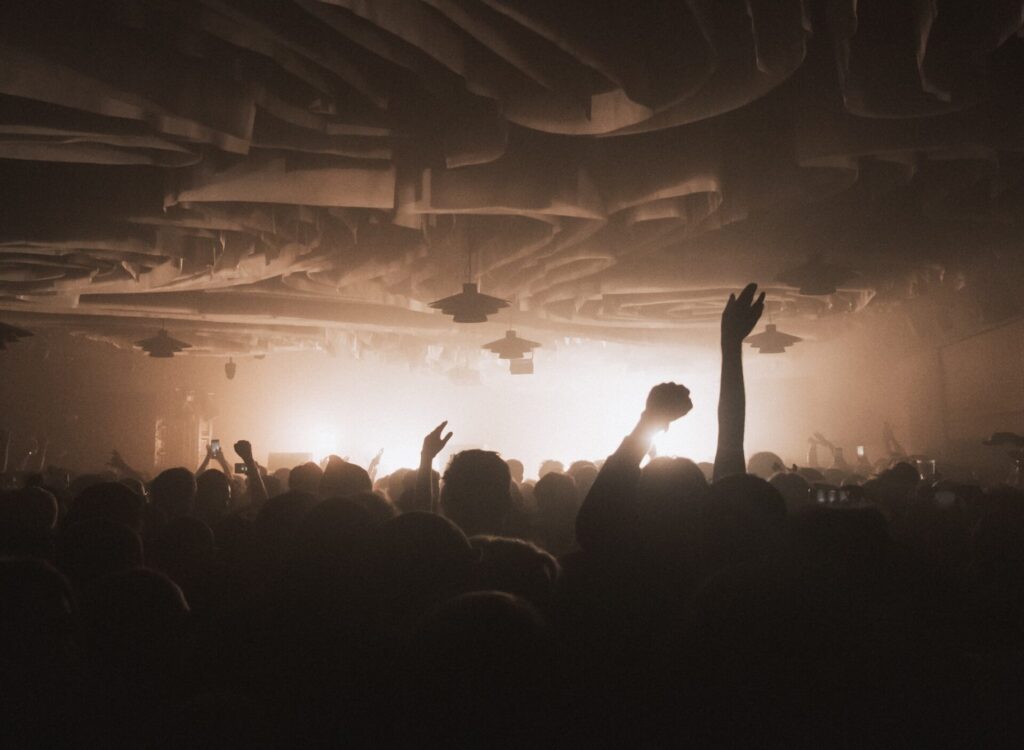For some, the biggest comeback of 2025 is the return of Oasis; for others, it’s Radiohead’s autumn tour; for me, it’s the return of Unsound’s weekend evening events at Kraków’s Hotel Forum. The brutalist building was opened on the banks of the Vistula river in 1988 after a decade of construction and ceased operating as a hotel in 2002. In 2012, Unsound started to hold the club elements of its programme in this perfect venue. With an atmosphere that combines immediate post-Communist Poland with Stanley Kubrick’s The Shining, it can often feel if time has stopped there.
As is often the case, art attracted investors, and over the past decade more and more spaces in the hotel being bought up by various business. The post-pandemic period continued the slow gentrification in the area, and the festival had to find another space to dance in. Happily, this year it has managed to return. Things have changed – those who remember the sets of a decade ago may be surprised by the rows of gaming tables, pool tables, or bowling lanes, and a small food hall where, under the banner of The Kitchen, Unsound held the legendary Singeli parties. However, the space between The Ballroom, Corner Stage, and the Twin-Peaks-like 1989 club (called The Lodge in the programme) remains a unique and wonderful space for Unsound. On Friday, the good news spreads that the building had been added to the Polish Register Of Historic Monuments.
Moving between rooms at Hotel Forum can be a strangely psychedelic experience – the impression is heightened by narrow corridors, smoke from the stage, crowds, and heat. On Saturday, as techno veteran Jacek Sienkiewicz and post-rap artist Piernikowski present their MAGMA project, the smoke that fills the Ballroom drifts all the way to the entrance. We all walk as if in a fog. Their set begins with subtle field recordings before electronic ambient music gives way to a distinct beat. Later, the two musicians play on the verge of techno and psychedelic slowed-down rave.
The duo of RP Boo and Gary Gwadera search for common threads of Polish oberek and footwork, the American serving up electronic strands while the Pole bursts up broken percussion on electronic pads. The music rushes along, blurring the boundaries between urban and rural folk. 2K88, uniting Rainy Miller, Bianca Scout, and Lauren Duffus, creates a melancholic electronic pulsing soundtrack, suiting Krakow in the rain, slightly nostalgic but engaging in its trance. The Bug is a frequent guest at Unsound, this time appearing with Warrior Queen. The dub sub-bass make the walls and floor tremble, shaking us all in a deep musical ritual.
In the Forum’s spaces, it’s worth moving between sound systems. Krenz and Karuzelkaaa deliver fat and dense post-grime beats in the Corner Stage. Nick Leon’s performance is upbeat and verging on pop, but darker, denser sets better suit this venue. Nazar, for instance, draws inspiration from Angolan kuduro, serving it up in a rough, wild, broken. Interspersed with the club and electronic sets are more experimental moments. Maria Bertel of Selvhenter and The Fire! Orchestra plays a trombone hooked up to a wall of amplifiers, creating music reminiscent of a dense metal riff. Similarly, Kuntari, whose music is based on the sound of trumpet, bass, and drums – choppy, rhythmic, and broken.
In the subterranean, carpet-lined space of Club 89, Joanne Robertson creates a unique, melancholic atmosphere with lyrical songs, played on guitar, that remind me of Grouper. Olga Anna Markowska, on the other hand, uses the cello and zither as her weapons, subduing their sound with the subtle bass keys. Performed among the club’s vertical red lights and futuristic design, it feels almost sci-fi.
Being back in the Hotel Forum is a reminder that the best moments when talking about music (such as its meaning and future) are not only an intellectual exchange, but also a communal experience. Today, this involves artificial intelligence, algorithms, and data collection. At the centre of conversations in the daytime discourse programme at the Krzysztofory Palace are questions about what creativity means in the age of automation, and what ownership looks like in a world where copying is instantaneous and unlimited, and how our listening to and relationship with music is changing in a data-dominated environment.
In his talk, Zachary Cooper, a musician in Concentration and copyright expert, traces the history of intellectual property and shows how its modern rules have become disconnected from the original idea of protecting creators. Cooper demonstrates how powerful record labels are in appropriating creativity and deciding its fate. The problem is not only the law itself, but also the scale of power of the so-called “Big Three”, who control most of the music market and have the resources to manage artists’ output at will. According to Cooper, it is not enough to patch it up – entirely new models of creative ownership are needed that give creators back their agency and enable them to reclaim influence over their work.
Liz Pelly, author of the fantastic book Mood Machine, focuses on how our listening to and relationship with music has changed in the age of platforms and algorithms. Recalling the days of music blogs, when sharing music was driven by passion rather than profit, she contrasted that grassroots, independent culture with today’s environment dominated by big tech companies. Rather than creating a community, activities have been turned into a product – users do the free work of providing data to algorithms, which in turn generate new, increasingly automated content. As a result, both listening to and creating music become passive processes, and the relationship with culture becomes shallow and commodified.
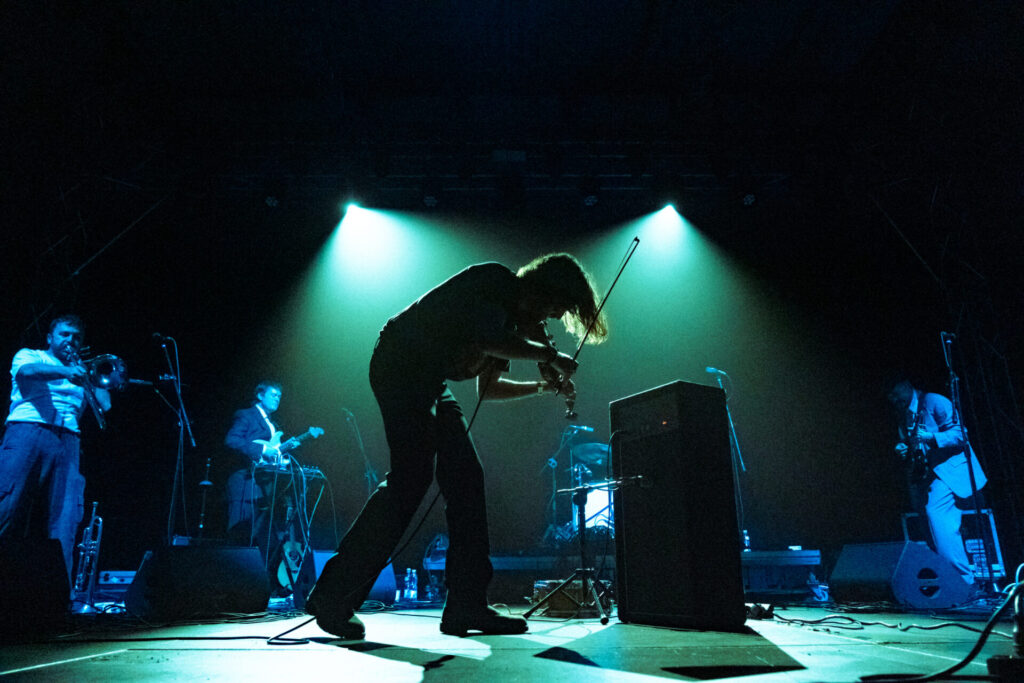
Unsound’s human-driven atmosphere of music discovery is also an exploration of Kraków itself, with the Łaźnia Nowa Theatre a focal point on the map. Aleksandra Słyż and Alex Freiheit present a unique musical performance called GHSTING, that also features Pola Nikiel and Katarzyna Sikora. Słyż’s powerful and expressive set, based on drone and dense synth sounds, is a perfect match for Freiheit’s tale of the group of people in a mysterious Hotel. In her lyrical narrative, she places emphasis on detail, making us feel as if we were there. The phantasmagorical tale of the Hotel Forum? Well, perhaps.
YHWH Nailgun play edgy music, a little spasmodic, in a math-rock frenzy, but minimalist in its own way, with a high level of tension they chose not to break. It might have been better for them to have followed the example of hardcore gigs that close in on 25 minutes by reflecting the brevity of their songs on record. By contrast, Caroline play ecstatically, like an avant-garde folk rendition of Broken Social Scene with a tension at times close to Godspeed You! Black Emperor. Jim O’Rourke and Eiko Ishibashi deliver a concert from another world. An ambient start becomes a multi-layered, carefully constructed music where electronic polyphony is intertwined with Ishibashi’s flute and O’Rourke’s electronics parts.
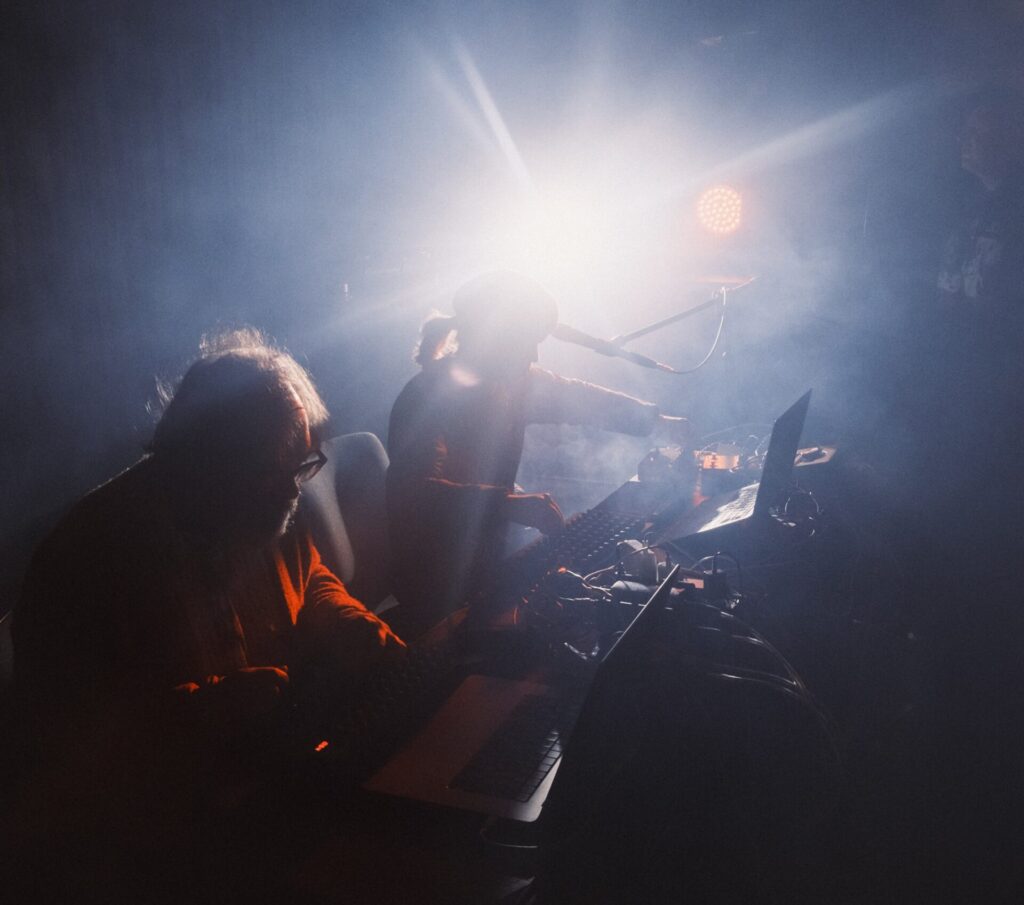
The concerts of the Afternoon Glory series take place in the former Clinic for Internal Diseases. Dating from 1901, it has a gruesome past – the steep-sided auditorium used to an anatomical theatre, where students could watch post-mortems and dissections performed on a wooden desk in the middle of the room. At Unsound, one “post-mortem” is Tashi Dorji’s guitar – he starts by playing rhythmic trance motifs, the movement of his thumb on the instrument making a raw, almost metallic sound. He boosts this with effects and his music smoulders, blending in perfectly with the strange room and gathering dark outside the window. In the same venue, Brìghde Chaimbeul’s bagpipes make a heavy, yet welcoming, drone as she occasionally adds bass sounds and sings. The audience applauds until she comes out for an encore. “I will strap myself into the spaceship again,” she says, filling the bag of her instrument with air. At Unsound, we are in the spaceship, too. – Jakub Knera
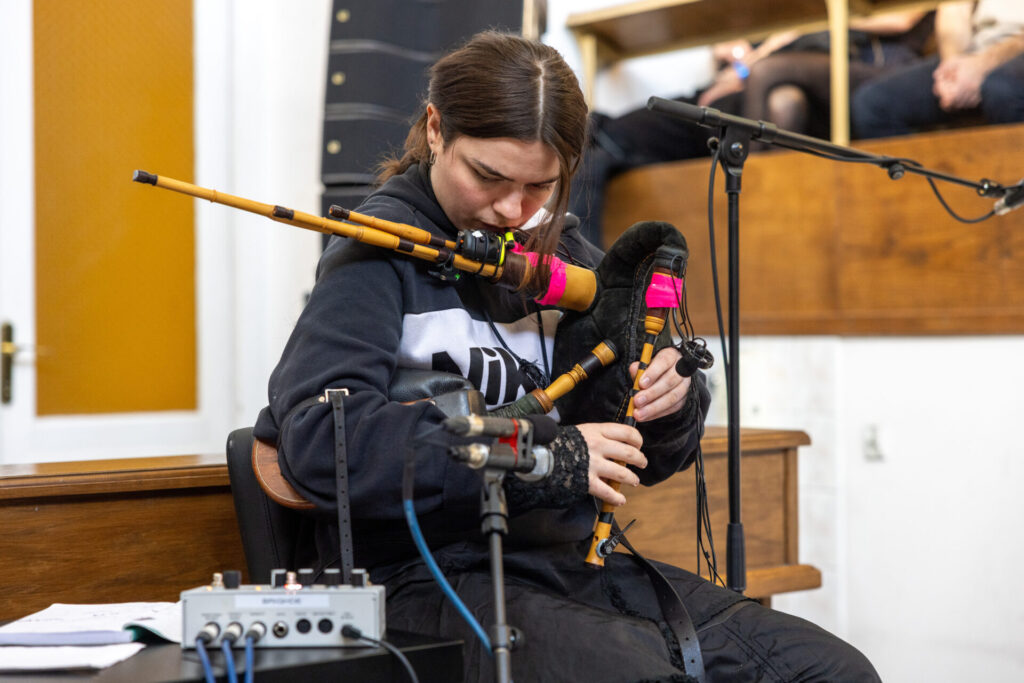
River of Fundament
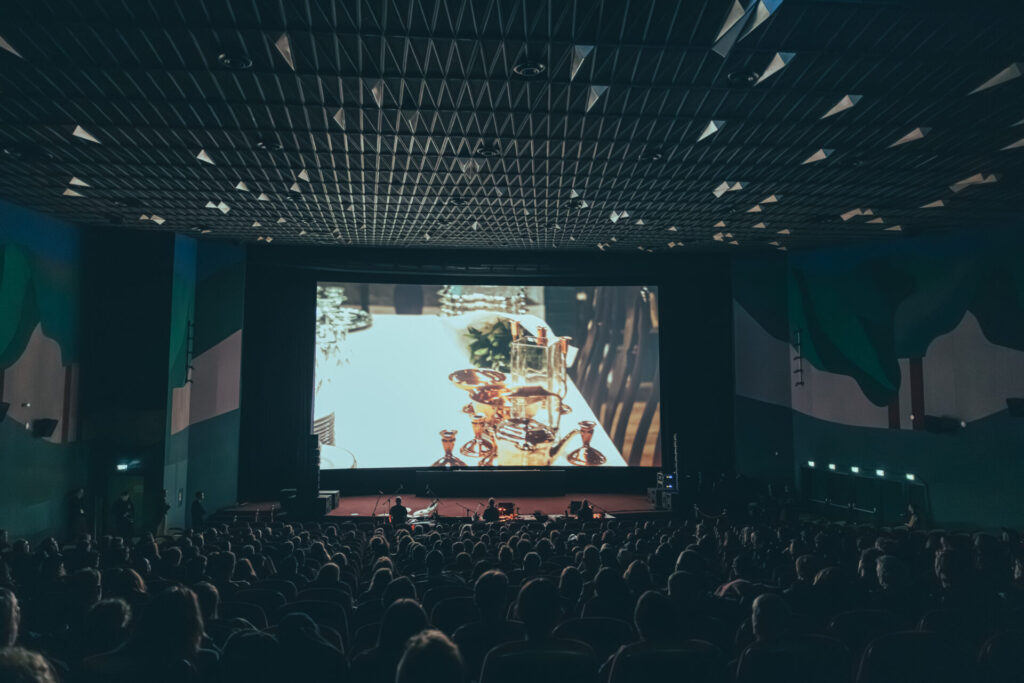
When programming a six-day festival, it’s not always easy to know where to put the world premiere live score for a five-and-a-half-hour operatic film about a shit-stained Norman Mailer repeatedly reincarnating out of its titular river of faeces. As the opening event for this year’s Unsound (presented without the Festival organisers’ traditional “Welcome to Unsound!” speech), it is monolithic – for fans and detractors. The screen is massive. The volume is cranked. The length is evening-encompassing – its 19:30 to 01:30 double-intermission runtime filling the space for any other opening-night programming. While unlike anything Unsound has presented before, its director – art star Matthew Barney – was apparently optimistic that the music-loving Unsound crowd would appreciate it more than its usual art and experimental cinema audiences who he feels have been beholden to inappropriate expectation of it as a film.
The film’s composer, Jonathan Bepler, is also credited as River Of Fundament’s director, spotlighting the foundational importance of its sound. Adapted at Mailer’s personal suggestion from his tepidly-received Egyptian mythological epic novel Ancient Evenings, the film is largely stitched together out of footage from three different site-responsive live performances, where a series of cars are destroyed and reincarnated as other cars.
Otherwise, the film is mostly exhibitionist in its impressive display of celebrities and fluids, from Giamatti’s toilet to the milk of a Gyllenhaal.
Bepler decided to leave the film’s recorded score in the film for this performance, augmenting it live with reliably brilliant Polish musicians percussionist Adam Gołębiewski and multi-instrumentalist Martyna Basta. With two tables littered with instruments to layer in, the best sequences are gargantuan – cacophonies of shredded cars, Gods and Basta singing, Gołębiewski’s thunderous drumming.
The work is ultimately divisive – less for its vaginas filled with turds to fuck / give birth to, and more for its structural strangeness. It is not easy to capture the intensity of live performance on film, hence River Of Fundament’s admirable gesamtkunstwerk ambitions to elevate the footage. If its success in doing so proves contentious, the live-again performance resounds. Bepler mentioned he has ambitions to further enhance this accompaniment with less on-screen sound, reincarnating Ancient Evenings again in pursuit of its final form. – Zachary Cooper

